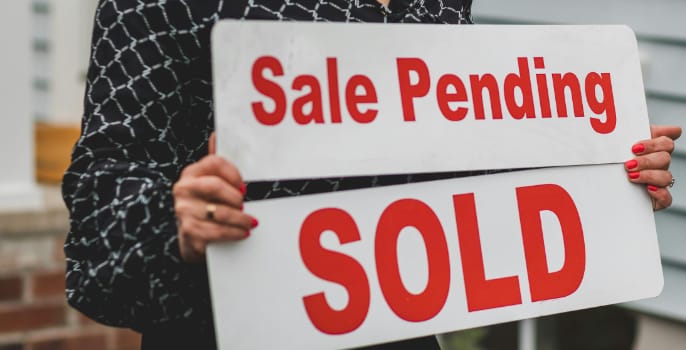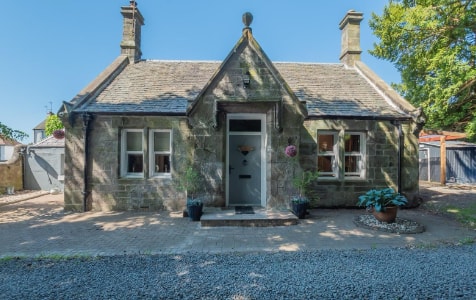Deciding whether to sell your current home before buying a new one or vice versa is a common dilemma for homeowners looking to move. Traditionally, the advice has been to secure a property to buy first before putting your current home on the market. However, with the property market landscape evolving rapidly, it’s essential to re-evaluate this strategy and consider the pros and cons of each approach.

The Changing Property Market Landscape
Over the past few years, the property market has experienced significant shifts, influenced by various factors such as economic conditions, government policies, and demographic trends. Increased mortgage rates, and the high cost of living, have hit the property market hard in recent months and potential buyers are reluctant to make a move.
One notable result has been the increase in the time it takes to sell a property. For example, in areas like Clackmannanshire and Stirling, the average time on the market has extended from approximately 12 days in February 2023 to nearly 68 days as of February 2024.
The Changing Property Market Landscape
Selling Your House Before Buying A New One – Pros:
Financial Security: Selling your current home first provides you with the financial resources needed to make a competitive offer on a new property and the knowledge of exactly how much you can afford.
Reduced Stress: Knowing that your current home is sold can avoid the potential pressure of carrying two mortgages simultaneously.
Negotiating Power: As a cash buyer, you may have more negotiating power and be in a stronger position to secure a favourable deal on your new home.

Selling Your House Before Buying A New One – Cons:
Temporary Accommodation: You may need to find temporary accommodation, such as renting or staying with family, while searching for a new home, as well as somewhere to store all the contents of your old house.
Limited Options: With a sale confirmed, you may feel rushed to find a new property, limiting your choices and potentially settling for a less-than-ideal home.
Bridge Financing: If you need to bridge the gap between selling your home and buying a new one, you may incur additional costs and interest with a bridging loan.
Buying First: Pros and Cons
Buying A New House Before Selling Your Current One – Pros
Flexibility: Securing your new home first allows you to take your time looking for the perfect new property without feeling rushed.
Avoiding Temporary Accommodation: You can move directly from your old home to your new one without the need for temporary accommodation.
Emotional Attachment: You can avoid the stress of potentially losing out on your dream home by securing it before selling your current property.
Buying A New House Before Selling Your Current One – Cons
Financial Strain: Carrying two mortgages simultaneously can put a strain on your finances, especially if your current home takes longer to sell than expected.

Double the Risk: There’s a risk of being stuck with two properties if you’re unable to sell your current home quickly.
Bridge Financing: Again, bridging loans may be necessary to cover the gap between buying and selling, adding extra costs and complexity to the process.
Simultaneous Approach: A Balanced Solution
Given the current dynamics of the property market, adopting a simultaneous approach—putting your home on the market while actively searching for a new one—may offer the best of both worlds. This approach allows you to gauge interest in your property while exploring potential new homes, providing the most flexibility and peace of mind.
Of course, this option also has its drawbacks, mainly in terms of time pressures trying to do everything at once. Despite your best efforts you could still end up in the situation where you have either found something to buy before your house has sold, or where you sell quickly before you have had a chance to find your next home.
How To Decide
Deciding whether to sell your house or buy first requires careful consideration of your financial situation, risk tolerance, and market conditions. While each approach has its advantages and challenges, the key is to weigh your options carefully and seek professional advice from real estate agents and financial advisors to make an informed decision tailored to your individual circumstances.
By asking a property expert for advice you’ll be able to make a decision based on the current market in your local area.

For example, if houses are selling very quickly, it’s going to be safer to find your ideal house first, before you put your one on the market. Otherwise, you run the risk of securing a sale fast before you have found anywhere else to live. In that sort of market you also risk losing out on properties you like if you are not able to make a rapid decision, but if you are confident that your own place is going to sell quickly it is easier to take the plunge and put in an offer.
However, if the local market is sluggish and houses are taking a long time to shift, your estate agent will probably suggest putting your house on the market first and waiting to make sure that it has sold before committing to buy something new. That way you avoid the situation outlined above where you have found a new home but still have to pay the mortgage on your own one until it sells.
In today’s dynamic property market, flexibility and adaptability are key to navigating the home buying and selling process successfully. Whether you choose to sell first, buy first, or take a simultaneous approach, the goal is to minimise stress and maximise the outcome of your property transactions. Taking advice from people who understand the current situation in your area can help you choose the way forward that is likely to be most beneficial to you at the time.



